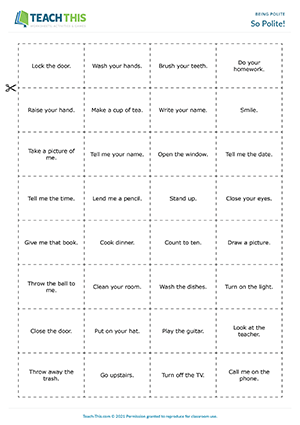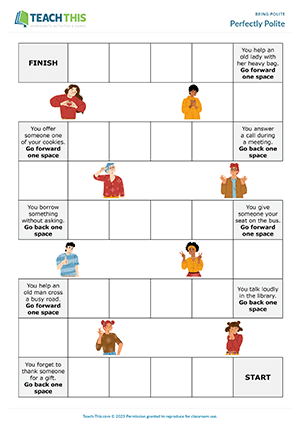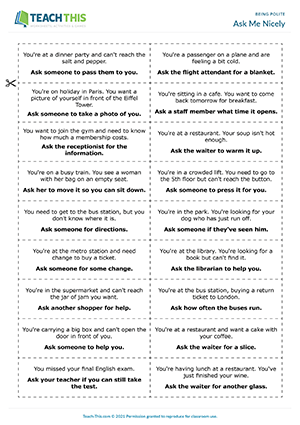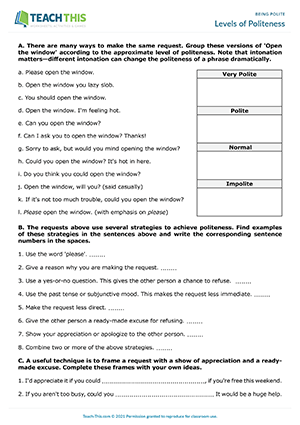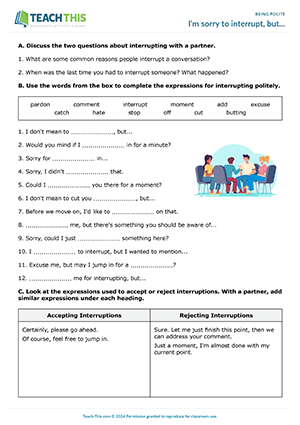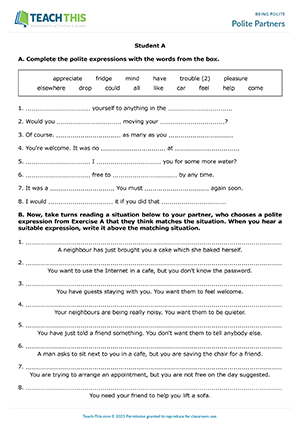In this free being polite game, students make polite requests with Could you..., please? and respond with thank you and you're welcome. In groups, students take it in turns to pick up a card and change the command on the card into a polite request starting with Could you and ending with please, e.g. 'Could you tell me your name, please?' The other group members then race to do or mime the requested action. The student who made the request responds by saying 'Thank you' to the first student to do the action correctly. That student wins the round, keeps the card, and replies with 'You're welcome'. The student with the most cards at the end of the game wins.
In this fun being polite board game, students race to say polite phrases and expressions that match different situations. One student starts by picking up a card and reading out the situation to the other two students, who race to say the polite expression written at the bottom of the card. When a student says the correct polite expression, they roll the dice and move their counter along the board accordingly. It is then the next student's turn to pick up and read out a card. The first student to reach the 'Finish' wins the game.
In this imaginative polite requests game, students compete against each other to come up with polite requests for various situations. In groups, students take turns picking up a card and reading the situation on the card to the other students. The other students then race to make a polite request. This can be done verbally, or you can have students race to write down a suitable request. The first student to make an appropriate polite request for the situation wins and keeps the card. Students must use a different polite request phrase each round, so if a winning request was made with Could you...?, on the next round, students would use a different phrase, e.g. Do you mind -ing...? The student with the most cards at the end of the game is the winner.
This comprehensive being polite worksheet helps students develop a sense of how to achieve different levels of politeness in various situations. First, students group variations of the request 'Open the window' according to the approximate level of politeness. After that, students find examples of different politeness strategies in the requests from the first exercise. Next, students complete polite request frames with their own ideas and share their answers with the class. Students then move on to rewrite requests to make them more polite and appropriate for each situation. Finally, students write requests that are appropriate for different situations.
In this creative being polite activity, students review expressions for interrupting politely and then participate in mini debates to practice the expressions. First, students discuss two questions about interrupting with a partner. Students then complete expressions used to interrupt politely with words from a box. Next, students look at expressions used to accept or reject an interruption and then work with a partner to add more expressions of their own under each heading. Afterwards, students participate in a debate activity to practice using the expressions on the worksheet. In groups of three, one student takes on the role of judge and timekeeper. That student picks up a debate card and reads it aloud. The other two students decide between them which side of the debate they will argue. The two students then debate the topic for two minutes, arguing their stances and using the expressions from the worksheet to interrupt their partner at least once. When the time is up, the judge stops the debate and declares the student whose argument they found the most convincing the winner and gives them the debate card. Students then swap roles and begin a new round. The student with the most cards at the end of the activity wins.
Here is an insightful being polite activity to help students practice commonly used polite expressions. First, working alone, students complete polite expressions with words from a box. Next, students take turns reading out a situation to their partner, who chooses a polite expression from Exercise A that they think matches the situation. If their partner agrees that the expression matches, they write it above the situation. The activity continues until all the situations have been matched with a suitable polite expression. Afterwards, check the correct answers with the class.
Latest Free
Resources
- Everyday Objects Bingo
Everyday Objects
Elementary (A1-A2)
- Action Verb Races
Actions
Elementary (A1-A2)
- Birthday Basics
Birthdays
Elementary (A1-A2)
- Sales Phrasal Verbs
Business Phrasal Verbs
Upper-intermediate (B2)
Latest Member
Resources
- Collocations at Work
Business Collocations
Intermediate (B1)
- Etiquette Trivia Board Game
Etiquette and Manners
Upper-intermediate (B2)
- Everyday Objects Vocabulary
Everyday Objects
Pre-intermediate (A2)
- Let's have a talk
Verb-Noun Collocations
Pre-intermediate (A2)



